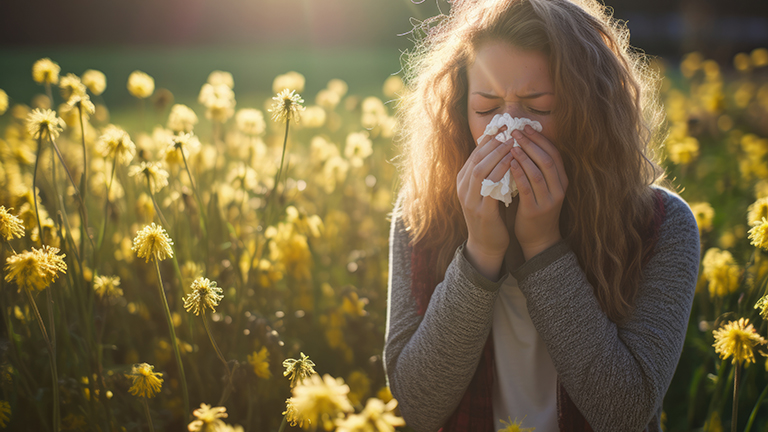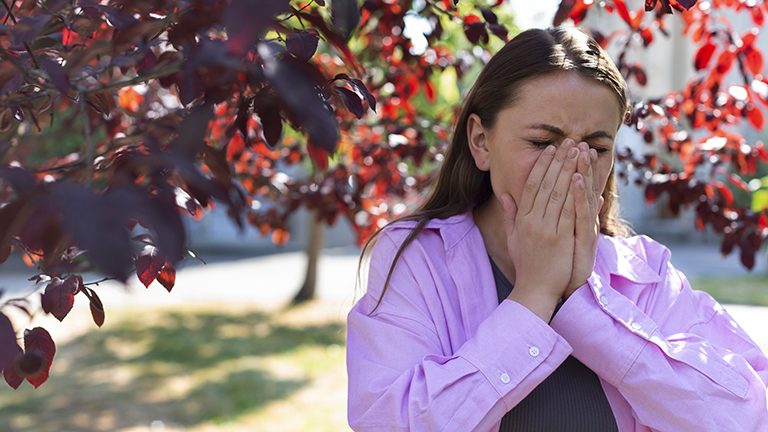Treatments for Seasonal Allergies: Spring is a season of renewal, blooming flowers, and warmer weather, but for millions of people worldwide, it also brings the challenge of seasonal allergies. Often referred to as hay fever or allergic rhinitis, these allergies occur when the immune system overreacts to environmental triggers such as pollen from trees, grasses, and flowers. The result is a cascade of symptoms including sneezing, nasal congestion, itchy eyes, runny nose, and fatigue, which can significantly impact daily life and productivity.
Understanding effective treatments for seasonal allergies in spring is essential for managing symptoms and improving overall well-being. While over-the-counter medications, prescription treatments, and natural remedies provide relief, lifestyle adjustments and preventive strategies play a crucial role in minimising exposure to allergens. This comprehensive guide explores medical and natural solutions, expert opinions, preventive tips, and practical strategies to help individuals navigate spring allergies safely and effectively, ensuring comfort throughout the season.
Common Causes of Spring Allergies
Role of Pollen in Allergy Flare-Ups
Pollen is the primary trigger for seasonal allergies during spring. Trees, grasses, and flowering plants release pollen into the air to facilitate reproduction, but this microscopic substance can provoke immune system responses in allergic individuals. When inhaled, the body identifies pollen as a harmful invader and releases histamines, causing symptoms such as sneezing, congestion, itchy eyes, and runny nose. Different regions experience variations in pollen types and concentrations, affecting the severity and duration of allergy symptoms.
[INSERT_ELEMENTOR id=”5108″]
Other Environmental Triggers
Apart from pollen, other environmental factors contribute to spring allergies. Mold spores that grow in damp soil, decaying leaves, and other organic materials can exacerbate allergic reactions. Dust mites, pet dander, and air pollution may also interact with seasonal allergens, intensifying discomfort for allergy sufferers. Recognising these triggers is essential for creating effective treatment and prevention strategies.
Symptoms of Spring Allergies You Should Know
Respiratory Symptoms
Respiratory manifestations of seasonal allergies include sneezing, nasal congestion, runny nose, coughing, and difficulty breathing. These symptoms occur as the immune system overreacts to allergens, leading to inflammation in the nasal passages and airways. Persistent exposure to pollen can result in chronic sinus congestion, making it harder to breathe and perform daily activities.
Eye and Skin Reactions
Spring allergies often affect the eyes, causing redness, itching, and watery discharge. Some individuals may develop allergic conjunctivitis, a condition marked by swelling and irritation of the eye tissues. Skin reactions, such as rashes or hives, can also occur in response to environmental allergens, particularly in individuals with a history of eczema or other skin sensitivities.
Best Medical Treatments for Seasonal Allergies
Antihistamines and Decongestants
Antihistamines are widely used to alleviate allergy symptoms by blocking histamine receptors, reducing sneezing, itching, and runny nose. Over-the-counter options like loratadine, cetirizine, and fexofenadine provide effective relief with minimal sedation. Decongestants, such as pseudoephedrine or phenylephrine, help reduce nasal swelling and congestion, improving airflow and breathing comfort. Combining antihistamines with decongestants can offer comprehensive symptom management, but long-term use of decongestants should be monitored due to potential side effects.
Nasal Corticosteroid Sprays
Nasal corticosteroid sprays are highly effective for treating moderate to severe seasonal allergies. These sprays reduce inflammation in the nasal passages, alleviating congestion, sneezing, and runny nose. Consistent use over several weeks may be necessary for optimal results. Commonly used sprays include fluticasone, mometasone, and budesonide, which are generally safe for daily use when following recommended dosages.
Immunotherapy (Allergy Shots and Tablets)
Allergen immunotherapy, including allergy shots and sublingual tablets, offers long-term relief for individuals with persistent seasonal allergies. This treatment gradually exposes the immune system to small amounts of allergens, building tolerance over time and reducing the severity of reactions. Immunotherapy is particularly beneficial for people with severe pollen allergies or those who do not respond well to conventional medications. A healthcare professional should supervise the process to ensure safety and effectiveness.
Natural Remedies for Spring Allergy Relief
Herbal and Home-Based Solutions
Several herbal remedies have shown promise in alleviating allergy symptoms naturally. Butterbur, quercetin, stinging nettle, and chamomile possess anti-inflammatory and antihistamine properties that may reduce sneezing, itching, and congestion. Incorporating these herbs into daily routines, either as teas, supplements, or topical applications, can provide supportive relief. However, it is important to consult a healthcare provider before using herbal remedies to avoid potential interactions with medications.
Breathing Exercises and Steam Therapy
Breathing exercises and steam inhalation can help alleviate nasal congestion and improve respiratory comfort. Practices such as diaphragmatic breathing, alternate nostril breathing, and gentle yoga techniques promote relaxation and reduce stress, which can exacerbate allergy symptoms. Steam therapy, involving inhalation of warm, moist air, helps thin mucus and clear nasal passages, offering temporary relief from congestion and sinus pressure.
Foods That Reduce Inflammation
Diet plays a significant role in managing seasonal allergies. Foods rich in antioxidants, omega-3 fatty acids, and vitamin C can help reduce inflammation and support immune function. Citrus fruits, berries, leafy greens, nuts, seeds, fatty fish, and turmeric are known to provide anti-inflammatory benefits. Maintaining a balanced diet with these nutrient-dense foods can complement medical treatments and improve overall allergy management.
Lifestyle Changes to Minimise Allergy Triggers
Keeping Pollen Out of Your Home
Minimising indoor exposure to pollen is crucial for reducing allergy symptoms. Keeping windows and doors closed during peak pollen hours, using high-efficiency particulate air (HEPA) filters, and regularly cleaning surfaces can help limit allergen infiltration. Washing hands, face, and hair after outdoor activities further reduces the transfer of pollen indoors.
Cleaning and Air Purification Tips
Regular cleaning and air purification strategies can significantly improve indoor air quality. Vacuuming with HEPA filters, dusting with damp cloths, and washing bedding frequently help eliminate allergens. Air purifiers equipped with HEPA or activated carbon filters can capture pollen, mold spores, and other airborne particles, reducing the likelihood of allergic reactions.
Outdoor Precautions in Spring
Outdoor activities during spring require careful planning to minimise pollen exposure. Wearing sunglasses, hats, and masks, avoiding outdoor exercise during peak pollen times, and showering immediately after returning home can reduce the impact of environmental allergens. Monitoring daily pollen forecasts and planning outdoor activities accordingly can further limit symptom flare-ups.
Expert Opinions on Allergy Management
Healthcare professionals emphasise a multi-faceted approach to managing seasonal allergies in spring. Combining medications, natural remedies, and lifestyle adjustments offers the most effective symptom control. Experts recommend individualised treatment plans based on allergy severity, overall health, and environmental factors. Early intervention and consistent management can prevent complications such as chronic sinusitis, asthma exacerbations, and sleep disturbances caused by untreated allergies.
Long-Term Outlook and Prevention
Seasonal allergies can persist for many years, but proactive management can reduce their impact on daily life. Regular use of preventive medications, adherence to immunotherapy schedules, and maintaining allergen-free environments contribute to long-term relief. Individuals can also adopt strategies to strengthen immune function, including proper nutrition, exercise, stress management, and sufficient sleep. Early diagnosis and intervention improve outcomes and enhance overall well-being during the spring months.
5 Tips to Manage Seasonal Allergies in Spring
Tip 1: Monitor Pollen Levels Daily
Check local pollen forecasts and plan outdoor activities when pollen counts are lower. Limiting exposure during peak hours can reduce sneezing, itchy eyes, and congestion.
Tip 2: Keep Your Home Allergen-Free
Close windows and doors during high pollen days, use HEPA filters in air purifiers, and regularly clean surfaces and bedding to minimise indoor allergen exposure.
Tip 3: Use Medications as Directed
Over-the-counter antihistamines, nasal sprays, and decongestants can effectively relieve symptoms. Follow dosage instructions and consult a healthcare provider for persistent or severe allergies.
Tip 4: Incorporate Natural Remedies
Herbal supplements like butterbur, stinging nettle, and chamomile, along with anti-inflammatory foods such as leafy greens, berries, and fatty fish, can support allergy relief naturally.
Tip 5: Maintain Healthy Habits
Regular exercise, adequate sleep, stress management, and hydration strengthen the immune system and help your body respond better to allergens, reducing the severity of seasonal allergy symptoms.
Expert Opinions on Managing Seasonal Allergies
Healthcare professionals emphasise a multi-faceted approach to managing seasonal allergies in spring. Dr. Emily Hartman, an allergist with over 15 years of experience, states that “the most effective treatment plan combines both medical interventions and environmental control measures. Patients often see the best results when they proactively manage exposure to pollen and use medications as recommended.”
Experts agree that antihistamines and nasal corticosteroid sprays remain the front line medical treatments, offering rapid symptom relief for sneezing, congestion, and itchy eyes. For individuals with severe or persistent allergies, immunotherapy, including allergy shots or sublingual tablets, is recommended to build long-term tolerance to allergens.
Natural remedies are also supported by research, with botanicals like butterbur, stinging nettle, and quercetin showing anti-inflammatory and antihistamine effects. Dr. Hartman notes that lifestyle modifications—such as monitoring pollen counts, using HEPA filters, and practising stress reduction—can significantly improve quality of life and reduce dependence on medications.
Experts stress that early diagnosis, consistent management, and personalised treatment plans are key to minimising the impact of spring allergies, preventing complications such as chronic sinusitis, asthma exacerbations, and sleep disturbances. Integrating medical therapies, natural remedies, and preventive measures ensures comprehensive relief and allows individuals to enjoy the spring season comfortably.
Frequently Asked Questions About Spring Allergies
How long do seasonal allergies last in spring? Seasonal allergies typically occur from early spring to late summer, depending on regional pollen patterns and individual sensitivities. Symptoms can last several weeks or months but vary in intensity.
Can children experience spring allergies? Yes, children are susceptible to seasonal allergies. Symptoms may include sneezing, runny nose, itchy eyes, and fatigue. Paediatric care providers can recommend age-appropriate treatments.
Are natural remedies effective for severe allergies? Natural remedies may provide supportive relief but are usually insufficient for severe allergy cases. Combining natural approaches with medical treatments is recommended for optimal symptom management.
Is immunotherapy safe for everyone? Immunotherapy is generally safe when supervised by healthcare professionals, but it may not be suitable for individuals with certain medical conditions. A thorough medical evaluation is necessary before starting treatment.
Can diet influence allergy symptoms? Yes, incorporating anti-inflammatory and immune-supportive foods can reduce symptom severity and complement other treatment methods.
Conclusion: Treatments for Seasonal Allergies
Managing seasonal allergies in spring requires a comprehensive approach that combines medical treatments, natural remedies, and lifestyle adjustments. Understanding the causes, from pollen to environmental triggers, helps individuals take proactive steps to reduce symptoms. Over-the-counter antihistamines, nasal sprays, and immunotherapy offer effective medical relief, while herbal remedies, anti-inflammatory foods, and breathing exercises provide supportive benefits. Lifestyle changes, such as keeping pollen out of the home, using air purifiers, and monitoring outdoor activities, further minimise exposure and discomfort. Early intervention and consistent management not only alleviate immediate symptoms like sneezing, congestion, and itchy eyes but also prevent long-term complications such as chronic sinus issues and sleep disturbances. By adopting a tailored combination of treatments and preventive strategies, allergy sufferers can enjoy the spring season with greater comfort and improved quality of life, ensuring that seasonal allergies no longer disrupt daily activities or overall well-being.


